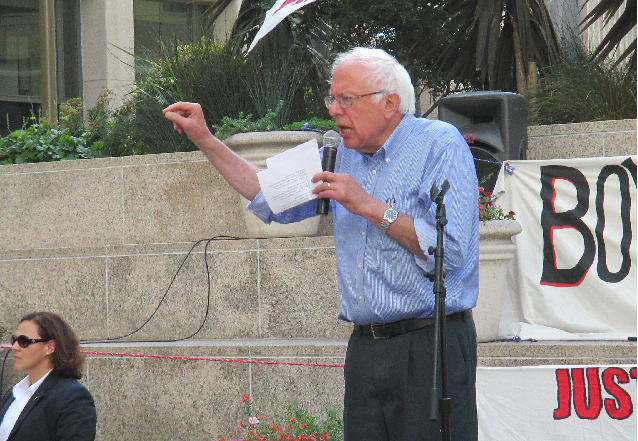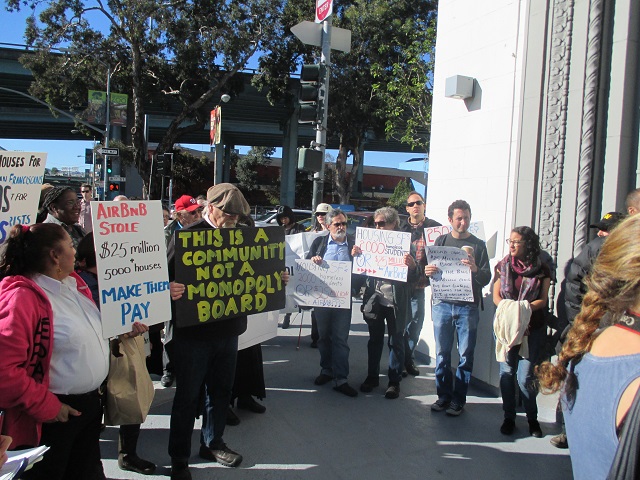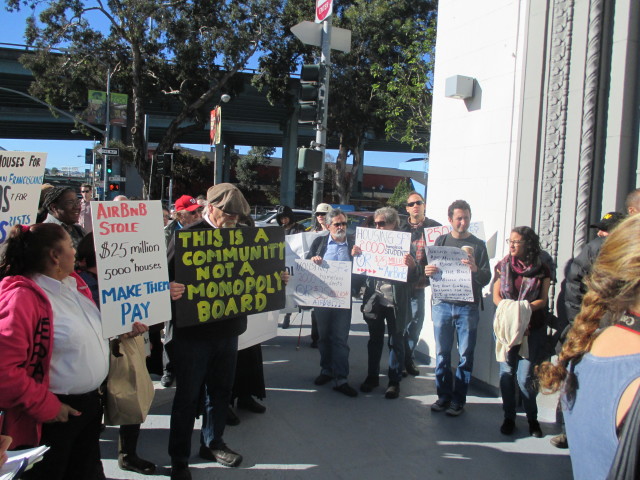So the San Francisco Chronicle can’t bring itself to issue an endorsement in the presidential primary. That’s pretty astonishing for a big-city newspaper in the middle of what could be a momentous election (if Sanders wins California, the potential for a contentious convention goes way up).
The reasoning, according to John Diaz, the editorial page editor: Hillary Clinton wouldn’t meet with the Chron Editorial Board. And Sanders, who did show up and took all of the Chron’s questions, just isn’t serious enough for Northern California’s largest paper.

That, frankly, is a pretty weak argument. Someone’s going to win; the outcome matters. Ducking the issue doesn’t help.
On the other hand, it’s an interesting moment in journalistic history. Clinton didn’t meet with the Chron because her campaign figures (probably correctly) that the endorsement of that newspaper matters exactly zero in this race. Do you know anyone who would decide whether to support Bernie or Hillary on the basis of what the San Francisco Chronicle recommends?
The Chron’s endorsements n top-of-the-ballot issues have never had a whole lot of impact in San Francisco. The paper for years was way more conservative than the town. Now some of the most savvy campaign managers in the country, who are deciding on Hillary Clinton’s media strategy, have concluded that it’s not worth her time to even bother.
Wouldn’t it be amazing if Bernie Sanders showed up in San Francisco Monday, on Election Day Eve, and endorsed the Reform Slate for DCCC? Just a rumor at this point, but don’t count it out – he’s already supporting Jane Kim for state Senate.
Tuesday, of course, is Election Day, and if you haven’t voted already, that would be the time to do it. If you are not registered with a political party, and you want to vote in the Democratic primary, you have to ask for a Democratic Party ballot. If you’re confused about any of this, the easy thing to do is vote early at City Hall; the Department of Elections staff can clear up any problems on the spot.
We will have live election-night coverage, of course, starting around 8:30pm, when the first results are available at sfelections.org. Keep checking back through the evening as we update what’s happening.
The Kim for Senate campaign, and the Yes on C campaign, and the Reform Slate for DCCC, and pretty much everyone else in the progressive camp, will be at The Oasis Tuesday evening watching the returns. 298 11th Street.
The Board of Supes will consider Tuesday/7 the measure by Sups. David Campos and Aaron Peskin to make the rules for short-term rentals enforceable. The bill cleared committee last week, and It’s pretty much certain that there are six votes for this; it’s also certain that the mayor will be considering a veto. And it’s certain that in an election year, some of the more centrist supes like London Breed (and maybe even Scott Wiener) will have a hard time voting against it.

Both Breed and Wiener voted against a similar measure last year. But that was last year, and Breed has been working hard to not offend tenants, since she’s facing a challenge from tenant activist Dean Preston in tenant-heavy D5.
It’s also certain that the mayor has lost a lot of influence in the past few months; he’s almost a lame duck already. That vote will be an epic moment in local politics.
The Police Commission was supposed to be discussing Tasers this week, but abruptly, and for no clear reason, all talk of the stun guns was removed from the agenda for an off-site community meeting. The new agenda still includes a discussion on the Use of Force policy, but notes that “discussion regarding conductive energy devices will be agendized at a later date.” Not sure why or what that means, except that Tasers are off the table – for the moment.
Here’s a classic power play: The agenda for the June 15 meeting of the Democratic County Central Committee includes a vote on endorsements for supervisor in the fall. The filing deadline for supervisor isn’t for another two months.
More important, the key issue in the current high-stakes DCCC race is the supes endorsements – and on June 15, the committee will be a lame-duck panel. If the progressives win a majority, they will take office a few weeks later. “We don’t usually even meet in June” after an election, member Rafael Mandelman told me.
Matt Dorsey, a DCCC member and corresponding secretary, said this violates all the existing rules for endorsements:
This last-minute addition of a lame duck endorsement session is unprecedented and deeply unprincipled.This is an 11th hour dirty trick. It betrays our principles, it ignores our policies, and it frankly defies common sense. If conservative Democrats win a majority on the DCCC on June 7, they can endorse their favored candidates through the normal process. And if progressive Democrats win a majority, they’ll simply overturn the lame duck endorsements, and make their own endorsements through the normal process.
If this actually goes through, a group of people who the voters rejected could be making critical endorsements. Does Mary Jung have no shame at all?
Street trees don’t sound like a hot political issue, but in some parts of time they have become a very big deal. That’s because the city has recently decided that it won’t be taking care of those trees anymore – the adjacent property owner will be responsible.
I am not one to cry for the homeowners in San Francisco, who have seen massive appreciation in value over the past few years and pay way too little in property taxes thanks to Prop. 13. But in some parts of town, particularly the southeast side, the Excelsior, Vis Valley, and even the Mission and Bernal and a few other places, there are homeowners with modest incomes (most of them, of course, bought the places decades ago). And they don’t want to cough up what can be at least several hundred bucks every couple of years to trim trees and fix the sidewalks where the roots have caused problems.
And they look around and ask: With all the money in this city today, why is City Hall suddenly dumping this problem on us?
Seriously, it’s got a lot of people really angry. And some of them figure it’s cheaper just to cut the trees down than to pay to maintain them. Which is not a good solution.
Sup. Scott Wiener’s idea, which comes up at the Budget and Finance Committee Wednesday/8, is to impose a modest parcel tax and use that money to pay for street tree maintenance. That would mean that everyone who owns property would pay for the trees, not just people who have trees in front of their property. Sup. John Avalos has a more creative concept: He wants a carbon tax to pay for street trees, which makes a lot of environmental sense. The supes could also just decide that the $13 million a year or so that this program costs is worth the money, and put it in the budget.








